December 31, 2003
sacred and ecstatic bodies
Trevor, I've just come across this Votive exhibition at Image and Text, which is an online contemporary art galley in New Zealand.
The exhibition is concerned with sacred and ecstatic bodies, the associations and slippages between the sacred and profane and eroticism in religious tradition.
Very Bataillian themes are they not?
Reading an article called Incisions and Excesses by Kyla McFarlane I notice that the exhibition is located within a critiques of the church, acts of religious devotion, and the emptying out of traditional sacred iconography. An example of the latter is Andre Serrano's Piss Christ,
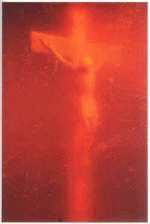 This work, if you remember, created such a huge furore in Melbourne when it was shown at the National Gallery of Victoria in 1997. It was deemed to be blasphemous.
This work, if you remember, created such a huge furore in Melbourne when it was shown at the National Gallery of Victoria in 1997. It was deemed to be blasphemous.
This critique of Christian religion establishes a shift from sacred to the profane and from the spiritual to the bodily, which in turn foregrounds the eroticism in religious tradition.
Philosophically this aesthetic critique works within the tradition of Nietzche and Bataille.
Where to next?
In the essay titled Unreasonable Passion by Mark Jackson we make a turn to Bataille. He picks up on the loss and reinscription of the sacred in modern forms of sovereignty can be derived from the writings of both de Sade and Georges Bataille. Jackson says that:
'If Sadean and Bataillean sovereignty pose a challenge to the foundation of law, singularity is the name given to the challenge they pose to modernity's absolute and autonomous individual epitomised in a liberal democratic notion of integral selfhood. Singular being is the locus for the ecstatic, pivotal to Bataille's notion of the sacred. For Bataille, this sacred was an unleashing of passions, and eroticism was a vehicle that made visibile this sacred and ecstatic singularity of being. It is for this reason that Bataille's erotic tales (as with Story of the Eye, Blue of Noon) need to be read in conjunction with his "philosophical" tracts (as with Inner Experience, Eroticism). Indeed, the opening sentence to Bataille's discussion of D.A.F. de Sade in Eroticism brings the entire series of concerns into relief: "There is nothing in our world to parallel the capricious excitement of a crowd obeying impulses of violence with acute sensitivity and unamenable to reason." If sovereignty marks a new relation to law that invokes the sacred as a violent overturning of reason by passion, this relation is enacted by a being whose relations to others is constituted by bodily excess that defies reason in its pursuit of intense pleasure.'
Jackson then goes on to discuss the works in the exhibition in the light of these themes. One of the works is this:
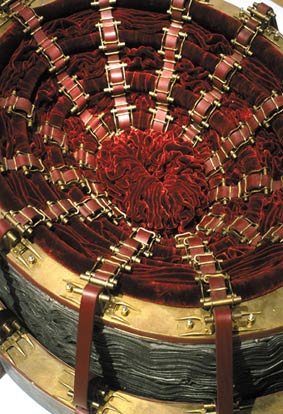
Cathy de Monchaux, Sovereign, (Detail) 1999
December 30, 2003
surrealism & sexuality#2
Trevor, I'd always understood surrealism to be an European art movement that happened in the 1930s and 1940s, but had died out with Jackson Pollock and abstract expressionism in New York. New York then ruled the art world.
Well, that's what the books produced by the art institution always tell us, do they not?
But a surrealism connected to a desire to live a better life lives on, does it not?
In an earlier post I said:
"Today we should be thinking of sexual desire interpreted through the dream-like surreality of sexual fantasy that is given cultural shape by sexual torture, perversion or a sexual wound."
Here are two recent examples that express the above paragraph by the same artist:
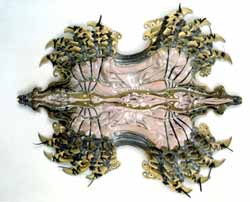
Cathy de Monchaux, Dangerous Fragility, 1994.
And:
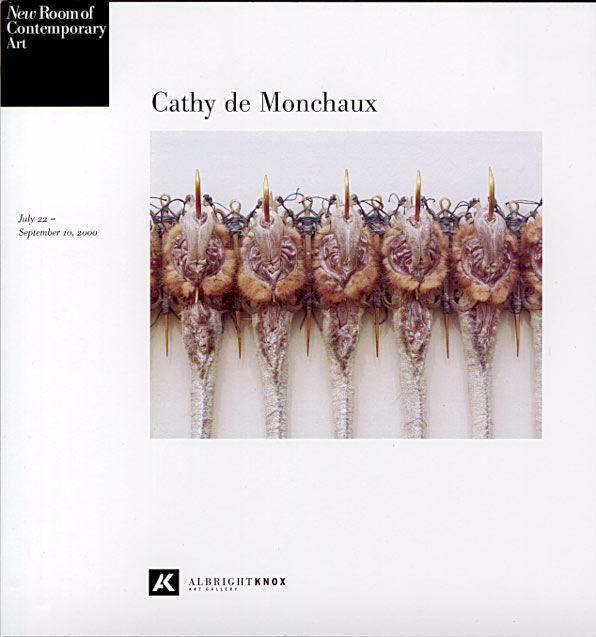
Cathy de Monchaux,
This expression of sexuality trangresses experiencing desire from a male perspective or as a narcissistic gaze within a patriarchal culture. It also transgresses the conventions of Marquis de Sade, Henry Miller and even Pauline Reage's Story of O.
This transgression can be seen Catherine Breillat's Romance. It flimed sequence of actual sex that transgresses the simulated sex of the money shot and the cream pie shot of the pornographic "underground." These, with their close-up shots of male and female genitals, are designed within a minimal narrative to arouse the male viewer and facilitate his masturbation and orgasm.
Where do we go with the trangressions of patriarchal and pornographic conventions?
'Romance' shows us. It restores explicit images of sexuality that have almost become the preserve of capitalist pornography. It works within the narrative and character conventions of mainstream Hollywood films to explore both the pornographic image and peel back the mythic layers of seductive romance to discover the meaning of sexuality for themselves. It takes back the explicit sexual images that have been colonised by the porn industry and then reworks them. The character is a women who dedicates her life to the freedom of the sexual pleasure.
This is what some of the sexblogs are exploring. A lot of women writing sex blogs use the explict porn images of erect male penises for their own pleasure. They, as free desiring subjects, have questioned the standard view that pornography only speaks about men to men.
This unsettles the porn conventions as does their reworking of the male sadomasochistic scenarios. Like Romance, and the 1954 Story of O before it, these sexblogs written by women are about female desire and sexual pleasure in a predominantly heterosexual and phallocentric world.
As the Elfi Mikesh & Monika Treut 1985 film, Seduction the Cruel Women, makes explicit, women are now exercising power for their own sexual pleasure.
Surrealism lives on through a conscious questioning of the meaning of pornography.
December 29, 2003
Christmas Cake
Gary, I’ve been laid low by Christmas, art and cricket. It’s a time for veging out, at least for me.
What you recently wrote about Australia and Europe in the twentieth century is interesting. It’s a past era, of course. Now there is no cultural isolation. We happen to be in the same city but we could equally be anywhere in the world.
The old Australian academic philosophies will die out and some day will appear as they actually are: as bizarre relics of a bygone era. But the new one, cognitive science (cs) is as bizarre as anything that preceded it. The difference is, cs is driven by mainstream US universities.
The spirit of cs is positivist – epistemology is first philosophy and the explication of scientific knowledge is the main task. So, it is dogmatic. It doesn’t answer to the spirit of unrest that Bataille so values in philosophy but instead aims to subdue that spirit.
It suits the old style Australian academic sensibility because it is physicalist. It believes in something like the mind-brain identity thesis – minds are physical processes but instead of being like steam engines they’re like computers. I prefer the steam engine analogy myself. It seems more friendly – Thomas the Tank Engine and that sort of stuff – but I’m old-fashioned. All the same, computers seem a better analogue for the fascist mind. (I’m being light-hearted.)
We need to get back onto the topic of pornography. Did you notice how the number of hits went up immediately pornography became the topic of discussion? Also, I’ve been unreliably informed that pornography is the main use of the internet, or the Web, or whatever it’s called. What is this thing called ‘telecommunication’? Judging by my unreliable information, it’s a realm where people can release their imagination if not their self. It’s insatiability. Are we the greedy species that can’t keep away from it? Or is it to do with the loss of our sovereignty? I prefer the latter perspective.
December 27, 2003
Bukowski Poem#8
Genius
I met a genius on the train
today
about 6 years old,
he sat beside me
and as the train
ran down along the coast
we came to the ocean
and then he looked at me
and said,
it's not pretty.
it was the first time I'd
realized
that.
Charles Bukowski
December 26, 2003
surrealism & sexuality#1
Trevor, when I unpacked another cartoon of my books just before Xmas, I came across Bernard Smith's Modernism's History (UNSW Press, 1998). I looked up what he said on surrealism, and I was presently suprised to find Bataille mentioned. So I kept on reading.
Anyway, this is what Smith says about surrealism:
?"The Surrealists saw themselves as the inheritors of the romantic tradition and the role they played ....may be viewed as the expression of a desire to develop and maintain a new role for the imagination in a Modernity posessed technologically of ever-increased power to absorb, transform and appropriate all criticism into celebratory effusions of its technologically driven teleology....For Dada/Surrealism is characterised by its transgression of the sanctities of autonomous art. Surrealism was also systematically transgressive in its approach to language, politics and sexuality."
I knew about the Dadist challenge to autonomous art and the male leer in surrealism. But I didn't know that surrealism was systematically transgressive in its approach to sexuality. Is this the radical edge of surrealism that has been blunted by the art institution?
Did you? I'd been guided by Adorno's scorn for Surrealism in Aesthetic Theory--trapped in a self-contained subjectivity---and so never bothered to explore it. The radical edge of surrealism is what Bataille opens the door to and explores. Bataille is not even mentioned in Adorno's Aesthetic Theory.
So I wonder who or what Smith has in mind? It would be interesting to find out, now that sex is everywhere in the mediascape; the images of sex cater to male desire through the construction of representations of feminine beauty; gender stereotypes have grown more rigid in explicit ads and movies, and we continue to hear calls for sexual abstinence (to combat aids?)
Smith does not say who or what he has in mind. Could it be Arshile Gorky?
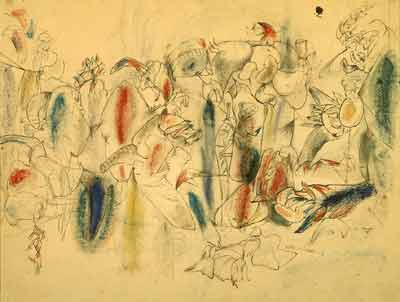
A. Gorky, Study for the Liver is the Cock's Comb, 1943
This study then becomes this abstract expressionist painting:
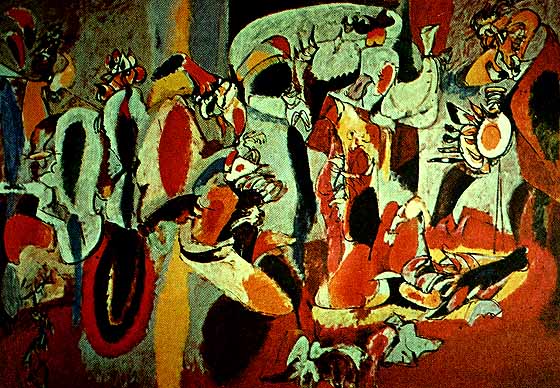
Gorky, The Liver is the Cock's Comb, 1944.
I don't see much that is sexually transgressive there.
Or did Smith have Andre Masson in mind? Or Matta?
With Matta I can see the poetry of sex:
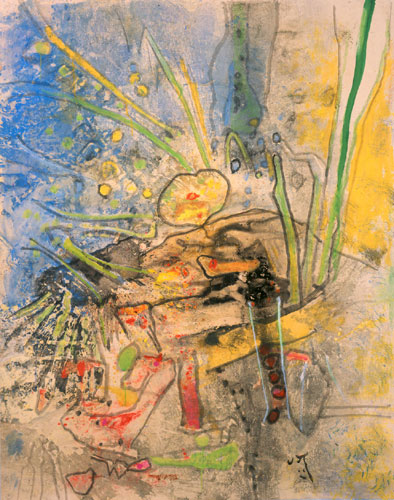
Matta
But little else.
It is probably Andre Masson whom Smith has in mind:
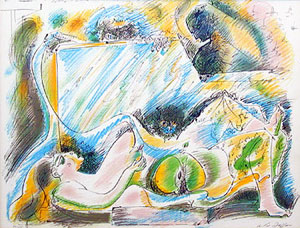
And:
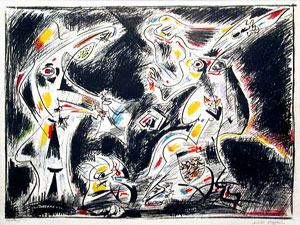
So sexuality in Surrealism starts as a personal declaration of recreating desire, moves on to express the way that imaginings that are never wholly one's own run riot over the conscious mind. Desire loosens both the boundaries of the possessive liberal individual, and the liberal distinction between public and private as desires spill over into art institutions and political ones.
But these surrealists did not seriously question the conventions of gender roles as did Cindy Sherman, with her postmodern wave of appropriation and artifice that focused on heterosexual desire. Films, such as Moulin Rouge, are full of corsets and perversion and gender-bending decadence. Now that sexuality in all its forms has become mainstream, can look back on surrealism as a precursor as an expression of desire and imagination unbound?
Aids is important here. Up to that point you could have sex with who you liked, when you liked. You didn't have to think about it as an issue, it wasn't a big deal. When AIDS came along it changed the way people behaved sexually as it was too risky to have a one-night stand or casual sex.
December 25, 2003
Xmas day
its a whimsical day where we dream and fantasize whilst enjoying ourselves with friends and family:
enjoy the day.
December 24, 2003
Derrida & Bataille: seismic shocks
Trevor I introduced the idea of 'style matters' in philosophy as a way to introduce the gap that exists between Anglo-American and Continental philosophy.
I introduce style to highlight:
*the disturbing relation between Australian and European culture. When not enclosed into wilful provincal isolation for most of the 20th century, Australia then became over receptive to the most difficult and strangest of the European writers. Australian radicals welcomed the French poststructuralists with open arms;
*the shared ground was a philosophy aligned with literature, criticism and art.
*the deconstruction of the liberal culture in Australia that resulted in lots of polemics about postmodernism and a battle of the schools in the philosophy institution;
*despite the family overlap the gap between Australian and European culture still exists because of the vastly different historical experiences. Hence the seismic tremors and aftershocks of Continental philosophy and deconstruction in this country.
Those whom you call French postmodernists may well be progressive in your sense. I don't know. I don't live in France, so I cannot judge them in their historical context. And I never meet Derrida when he visited Australia to talk about painting at the Power Institute. So my relation to them is through the archive; an archive that has become part of the creative industries. By this I mean that Derrida's individual creativity, skill and talent is seen to have a potential for wealth and job creation through the generation and exploitation of his intellectual property. Hence the Derrida industry.
In my academic context here in Australia the French poststructuralists (Foucault) and postmodernists (Baudrillard) stood for a different style. Different style here means possibilities of reading and writing philosophy differently. That is how their content touched me.
They opened up doorways for me to step through. Stepping into fresh air after trying to breath in the stale air of a claustrophic academia. That means taking philosophy into different places where it has never been. It means philosophy engaging with concerns that it once turned its nose up- in disgust---eg., literature, sex, pornography etc.
Bataille is different. There is more, much more depth. He is more personal and less academic. But I came to Bataille through Derrida. I did not know what I'd walked into with that doorway.
I was quite comfortable with the structuralist levelling of high literature and its reading of cultural phenomena. Unlike many conservatives in the literary or art institution I had no desire to defend literature or art from the radical structuralist attack. Both institutions were in need of deconstruction. I saw the French poststructuralists as deconstructing the philosophical tradition and so continuing to drive the ethos of philosophy as critique.
A limited critique since they accept the old story of philosophy being invented in Greece, becomes a sedimented modern tradition in northern Europe, and its Platonism is inverted by Nietzsche. Even Heidegger works within it, as his destruction of the tradition, as something made and fashioned through a process of repetition, is primarily concerned with the retrivial of the positive tendencies of the philosophical tradition in the light of technological enframing by instrumental reason.
It's an old Greco-European story that is tied into, or a part of the history of, European imperialism and the metropolitan powers of European colonalism. This particular culture was then represented as universal. We were both educated within it, even if this traditon was given a Marxist reading.
Maybe we should begin to read the closed Greco-European philosophical tradition in terms of violence and metaphysics.
December 23, 2003
The Post-modernists
Gary, I wasn’t sure why you called your last entry ‘style is important’.
Whether or not the late 20th century French philosophers were a bunch of academics looking for career openings doesn’t really matter. Subjective motivations aren’t strictly relevant. Individuals might being trying to save the world or become rich. It doesn’t matter.
What matters is that they work within what Deleuze called a specific territory – i.e., academia. A territory is a rule-governed space. So when they came at Bataille they came at him in a particular rule-governed way.
Subjectively, Derrida, Foucault, Lyotard, Irigarary etc were strange guests in late twentieth century Australia. But I don’t know if I agree that they were ‘eventually domesticated’. Yes, they caused turbulence within conservative ranks but that is because they stood for progressive forces, indeed progressive forces in their most revolutionary mode. The question that must be asked is, what did it mean to be progressive in the twentieth century? The answer is simple. Tony Blair and Bill Clinton represent progressive forces. They represent the progressive realisation of corporate interests. And this does not take place within some neutral territory. The actions of Blair, Clinton, Bush, Howard, etc changed the territory into a corporate territory. The French post-modernists belong within this territory. They didn’t need to be domesticated. Their philosophy is corporate to its very core.
The conservatives, like our mate W (with whom I’ve been working all year), haven’t given up on reading the classics, even if they try to read them within a post-modern framework. In particular, W saw the new administrative arrangements as a chance to teach those aspects of our literary and philosophical culture excluded from the older ‘liberal’ university. The conservatives are disgruntled bedfellows but in the end they’ll go along with the progressives.
The people in the Philosophy Department are a strange phenomenon, appearing at first glance to resist the corporatisation of the university. But it is exactly that – an appearance. In fact the liberal philosophy department has already been dismantled. Instead of a group of people representing the various divisions of the philosophy curriculum, they have a group of so-called ‘cognitive scientists’. The strange part of the process has been the preservation of the departmental structure despite this transformation. Nonetheless, cognitive science is just an element of corporate bullshit and could be readily incorporated. They’ll probably eventually decide that they don’t need so many people in one area, then goodbye cognitive science, but that’s another matter. While all this has been going on, no one has noticed that philosophy has already been done away with.
So, goodbye to the herd animal? Well, yes, but in Guilty Bataille also writes of philosophy being eternal questioning. He writes of the absence of rest philosophy fosters. It is with this absence of rest in mind that I want to question the contemporary role of the destroyers of the old. That is the source of my attitude to the post-modernists. Talking about what is wrong with analytic philosophy doesn’t have the same relevance.
On Nietzsche:#5----Intensity & porno chic
In a previous entry I mentioned Bataille's desire to write with blood and to live a life of intensity through risking oneself.
Further on in Chapter 3 Bataille links this desire to "going to the furthest reaches of the possible." He adds:
"To live out possibility to the outmost means many will have to change --taking it on as something outside of them, no longer depending on any one of them."
Sounds like sex drugs and rock & roll life to me. Living a punk life of a Sid Vicious; or the excess of the glam rock and roll "avant garde" who ends up dying from choking on their own vomit in some hotel room.
Hardly the sort of life that every day suburbanites can explore. They cannot live such a life of intensity of a Paris Hilton. Theirs is a life of work, mortgages, kids, school etc. What Nietzsche calls the herd life. Nor can suburbanite Middle Australia realistically live a life of intensity through becoming drug criminals and living by the gun as urban cowboys.
Bataille understands the limitations of a life of intensity. He quotes Nietzsche to the effect that such a life is nomadic life without family, friends or community; however much one may desire a community of like souls.
Realistically it is a lonely life full of suffering that requires a lot of Stoic care of self to deal with the weight pressing down on their necks.
All that Bataille has is Nietzsche's texts and his own writing.
And us? We do not live in 1940s France. Many are exploring a life of intensity through sexuality and living out their sexual fantasies through porn and they take risks in doing so. Porn is the way to way to critique our highest moral values, destroy our sickly virtues and recover our healthy instincts. Porn is what transgresses our moral codes, even as it is tamed and civilized as porno chic by the fashion, advertising and media industries:
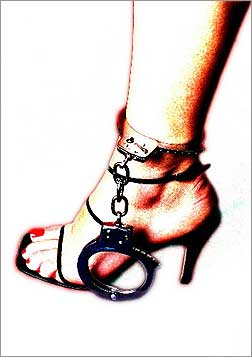 For the fashion industry sex is in, sex is now, sex is porno chic.
For the fashion industry sex is in, sex is now, sex is porno chic.
Porno chic is the cutting edge in fashion as a fashion style.
Porn does not belong underground. It belongs on the fashion catwalk.
Porno chic is a marketing campaign run by the Parsian fashion houses. They---the fashion advertisers---- know that sex sells.
 The advertisers say that they are simply providing a forum through which the creative genius and artistic values of some of the world’s best fashion photographers can find full expression.
The advertisers say that they are simply providing a forum through which the creative genius and artistic values of some of the world’s best fashion photographers can find full expression.
But they---the advertisers and photographers--know they have to keep pushing the boundaries of taste, regulation and moral codes to ensure that sex sells their product. So we have the old avant garde technique shock being used by
The shock factor posted on billboards and bush shelters throughout the city of Paris:
"Yves St. Laurent's ghostly white naked woman, caressing herself into a state of ecstasy. She's selling perfume. Other ads feature women who are bruised, bullied, even consorting with animals. One recent billboard for the fashion house La City showed a woman, wearing only underpants, suggestively posed on all fours next to a sheep."
One of Gucci's latest advert features catwalk model Carmen Kass revealing her pubic hair, skillfully shaven into the shape of the company's trademark, whilst being pushed against a wall by a male model.
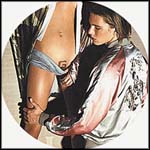 It was carried in the February issue of Vogue. Though some of these images are seen as offensive and degrading to women, the shock factor in the sexually orientated explicit images creates the exposure of which every chief advertiser dreams. It is this lure that drives the mighty, profit-hungry fashion houses, and not the promotion of innovative fashion imagery.
It was carried in the February issue of Vogue. Though some of these images are seen as offensive and degrading to women, the shock factor in the sexually orientated explicit images creates the exposure of which every chief advertiser dreams. It is this lure that drives the mighty, profit-hungry fashion houses, and not the promotion of innovative fashion imagery.
It is very hard living a life of intensity suggested by Bataille in consumer capitalism. This is a very different mode of life to that of 1940s Catholic France. In between stands the visual imagery of a Helmet Newton
December 21, 2003
style is important
Trevor you previously dismissed a lot of the late 20th century French philosophers as a bunch of academics looking for a new line on which to build a career.
My response is that historical context is important. I can only relate to these people (Derrida, Foucault, Lyotard, Irigarary etc ) in terms of their reception here in Australia. They were strange guests who spoke very differently even for someone who had read a lot of German philosophy. They were guests who were eventually domesticated, for all the turbulence they caused within conservative ranks.
In spite of this domestication, the effect of Derrida was that his writings opened up the conservative philosophical culture in Australia, which had given up on reading the classics. He also helped shift philosophy away from the old problems and arguments to texts and reading. Hence he was attacked by those who wished to preserve the institution of philosophy unchanged and were hostile to different ways of writing, new pathways of reading, new vocabularies around ethics, subjectivityand politics.
And it was a different way of writing and reading. Just look at Derrida's Glas with its split into the two columns on Hegel and Genet. That text has a very different critical and intertexual style in terms of Hegel scholarship and indicated that a work could b not be understood by itself by only in relation to other texts.
I would also agree that a lot of those who embraced continental philosophy in Australia saw themselves as iconoclasts destroying liberal humanism. Though they enlarged the canon of philosophical texts they elided the German connection (Nietzsche & Heidegger) that had feed French philosophy since the 1940s.
The new iconoclasts were actually conservative in their understanding of how philosophy was practised---ie., it's style and rhetoric--- and the form and function of philosophy. They actually helped the institution of philosophy stay together during its political crises-- such a long way from the destructive spirit of Nietzsche towards the philosophical tradition.
Maybe we should see them as wily conservatives who barely threatened the entrenched division between literature and philosophy, had little understand of romanticism or the currents of modernist art.
December 19, 2003
Bataille: On Nietzsche#4
Trevor,
you wrote the following in an earlier post:
"Perhaps this very Weblog is a scar of subjectivity, a kind of measure of our inability to properly communicate in any other way. It’s all dressed up as disinterest, a scholarly pursuit, but why would we want to engage thus? It lacks intensity. Perhaps philosophy is compensation."
Philosophy and intensity. It is hard to put the two together. Intensity is usually associated with poetics, eg. Bukowski's poems.
The third chapter of Bataille's On Nietzsche has some relevance here. Bataille works off a section of BK 11 of Nietzsche's Will to Power where Nietzsche is getting rid a few common superstitions about philosophers.
In this section Nietzsche is concerned with philosophy as part of a critique of highest values. He advocates a conception philosophers as detroyers of the old and decayed, and celebrators of what is coming and lies in the future. (para417) He opposes this to the scholarly conception of the philosopher, "that herd animal in the field of knowledge----who inquires because he is ordered to and because others have done so before him---" (para. 421)
So what does Bataille do it? He begins with a Nietzsche quote about being a recluse and seeking a friend, then another Nietzsche quote about teaching a philosophy that is dangerous to life.
He then writes a passage about his writings and life. He says that if ever gets the chance to trite out his last words in blood, it would write something like along the lines of his writings, life and loves all being considered as communication. He then asks:
'How could I live my life otherwise? Living this recluse's life, speaking in a desert of isolated readers, accepting the bouyant touch of writing. My accomplishment, its sum total, is to have taken risks and to have sentences fall like the victims of war now lying in fields... True, I live on, even now full of life, though I declare, "If you me find reluctant to take risks in this book, throw it away; if on the other hand, when you read me you find nothing to risk yourself, then listen: Throughout your life up until your death, your reading will only corrupt you...and you 'll sink with corruption.'
A philosophy dangerous to life is taking risks. It is avoiding the emptiness in writing.
That emptiness is so common today, especially in a lot of academic writing. Book after book at absurd prices is offered to us as consumers with each saying very little. These books are marketed with a flourish by the various presses, then they are immediately forgotten and remandered. Often they are found in second hand bookshops. It is how I pick some of them up these days.
Maybe Bataille can show us to link intensity and philosophy instead of philosophy as scholarly compensation for the aching emptiness in our lives.
December 17, 2003
Bukowski Poem#7
For Jane
225 days under grass
and you know more than I.
they have long taken your blood,
your are a dry stick in a basket.
is this how it works?
in this room
the hours of love
still make shadows.
when you left
you took almost
everything.
I kneel in the nights
before tigers
that will not let me be.
what you were
will not happen again.
the tigers have found me
and I do not care.
Charles Bukowski
December 16, 2003
Intensity
Gary, I agree with most of what you’ve written over the last couple of days – eroticism as assent to life up to the point of death (beyond really), the end of individuality, the distinction between physical, emotional and religious eroticism – and particularly your emphasis on intensity. However, bringing it back to the similarities between sovereignty and sleep, I would add this: there is nothing very intense about the cow standing in the pasture (see Bataille’s interview by Duras). Indeed, it seems the antithesis of intensity.
The intensity of sensation you rightly emphasize is significant in a specific historical context - perhaps it becomes significant in any or every historical context (I’d be happy to concede that). The role of fashionable chic porn is domesticating. History is foremost an history of domestication. Sovereignty cannot be domesticated. All the chic porn does is make us long even more for sovereignty, and under these circumstances I don’t think the pursuit of sovereignty can be separated from intensity, feral intensity.
Perhaps this very Web log is a desire for intensity of this kind, but we wouldn’t be doing it if we weren’t fucked up by life (and that’s a social life, a domesticated existence). This is not to say that our lot is any more miserable than that of anybody else. Obviously it’s nowhere near as miserable as that of huge numbers of people. It’s a middle class misery, but we’re getting close to Freud again. But we’re not ingrates who should be thankful when we compare our lot with others. The feeling is there. It’s not voluntary. And it leads to death.
Perhaps this very Web log is a scar of subjectivity, a kind of measure of our inability to properly communicate in any other way. It’s all dressed up as disinterest, a scholarly pursuit, but why would we want to engage thus? It lacks intensity. Perhaps philosophy is compensation.
December 15, 2003
Surrealism & philosophy
Trevor, you may not know but most of my books from the academic days are stored away in boxes in the store room in the holiday shack at Victor Harbor. I do not have shelf space for them in town. The books have been stored that way for several years.
Late this morning I started unpacking a box of art/aesthetic books, and I came across some old texts on surrealism. There was a catalogue of a dada/surrealist exhibition at the MOMA in the 1960s, Andre Breton's First Surrealist Manifesto and The Philosophy of Surrealism by Ferdinard Alquie, which was published in 1969.
These texts caught my eye as I remembered these remarks you made earlier post:
"I would argue that surrealism is not an alternative practical philosophy in this sense, with a vision for a future reconciled state of affairs. In fact, it is not a philosophy at all, even if it leads to certain philosophical pronouncements. It stands in essentially the same relation to reason as does poetry. Hegel's view of art came from his systematic theory, rather than from observing the character of actual art. If any story is out of date according to our current sensibilities it is Hegel's. Max Weber's view is much closer to our own.You call this reconciliatory surrealism Bretonian surrealism. You may be right. I have not given enough thought to Breton to say one way or another. Perhaps we could pursue the matter further in the near future."
Both of the above texts are highly influenced by Andre Breton's psychological understanding of surrealism, dream image, automatic writing, and beyond reason, and aesthetic and moral preoccupations.
The MOMA catalogue's understanding of surrealism the firstr wave of surrealism emphasises the interior image that points to what had been inaccessible (the unconcscious); rather than the perceptions of objects in everyday life. What is highlighted is the juxtaposition of images common in free assocation and dreams:

Joan Miro Landscape (The Hare), 1927.
It is all about the visionary, poetics and metaphoric order. A literary informed unconscious mindscape as it were:
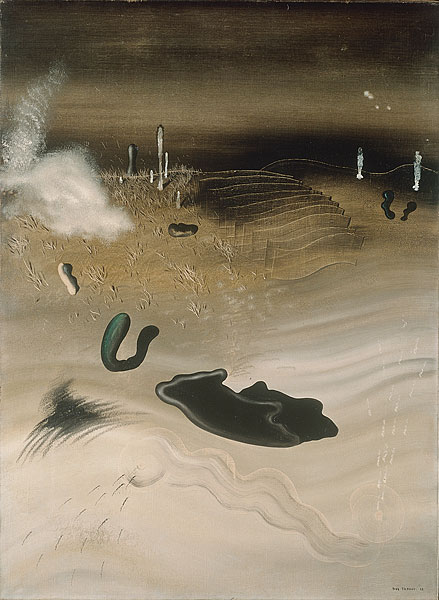
Yves Tanguy, Old Horizon, 1928
The MOMA catalogue mentions the rupture in surrealism in the late 1920s, Breton's Second Surrealist Manifesto of 1929, and the arrival of Salvador Dali. There is no mention of Bataille or the reasons for the fallout between Breton and Bataille. The MOMA text is an art history of the European avant garde, its transplant to New York in the 1940s and its death knell in 1947 with the rise of Jackson Pollock, drip painting and abstract expressionism.
Though the word philosophy is used, there is no exploration of the relationship between philosophy and surrealism. This is an art history blind to the aesthetic categories it uses.
In The Philosophy of Surrealism Ferdinard Alquie says that surrealisim is the pathway of emotion, dream, reverie, poetry madness and rejecting constraints and limits. He identifies surrealism with Breton:
"...the definition of surrealism would become unweildy if distinquished from Breton's expressed ideas taken as a whole.To ask who really has or has not been surrealist would end in insoluble quarrels over words--- any refernce to surrealism an sich being naturally impossible. As those splitting with Breton have generally ceased to call themselves surrealists, we can consider Breton's thought and as essence and norm for the philosophy of surrealism without wronging anyone."
That does away with Bataille. That does away with the ugly. We are left with truth and beauty.
On this account surrealism involves an "authentic theory of love, of life, of the imagination, of the relations between man and the world. All this presupposes a philosophy" which Alquie then tries to isolate and define through the work of Breton.
In aesthetic terms the opposition between beauty and the sublime (on the one hand desire and the pleasurable experience of the beautful, and on the other hand, the pleasures of the fearful or terrifying experience of the sublime) is collapsed.
December 14, 2003
Bataille & Erotic: #3: de Sade
A question.
How does Bataille distinquish his conception of the erotic from the erotic whims and fancies of some famous sovereign personality who satisfies his/her exuberant desires without limits? Who satisfies their impulses of violence without limits by living out their fantasies of being rapacious conqueror of old. A person subject to no restraints at all; a master who falls on their victims with the devouring fury of a hungry wolf or lion?
In the sex blogs porn is defined as if erotic behaviour involves doing it for money and without the emotions. It's a business. And consent is the key to anything goes. No consent to unleashed frenzy means rape. If you consent to your body being devoured by a monster, then its okay to explore whatever fantasies excite you and intensify the pleasure.
In Eroticism Bataille argues that the Marquis de Sade insisted that his sovereignty was premised on the denial of the rights and feelings of others. His prison texts give us a person for whom other people did not count at all. Bataille is not fazed by this. He says:
"By definition, excess stands outside reason. Reason is bound up with work and the purposeful activity that incarnates its laws. But plasure mocks toil, and toil we have seen to be unfavourable to the pursuit of intense pleasure...the pursuit of pleasure even if reckoned as useful is essentially extravagant; the more so in that usually pleasure has no end product, is thought of as an end in itself and is desired for its very extravagance. This is where de Sade comes in. he does not formulate the above principles, but he implies them by asserting that pleasure is more acute if it is criminal and the more abhorrent the crime the greater the pleasure. One can see how the excesses of pleasure lead to the denial of the rights of other people."
de Sade is the starting point for Bataille. Erotic conduct is the opposite of normal conduct as spending is the opposite of getting. Sexual pleasure is so close to ruinous waste that we refer to the moment of climax as a little death. The path of sensuous disorder is also the path of destruction and betrayal. The sign posts are brutality, murder, prostitution and coarse language. These play their part in turning the erotic world of sensual pleasure into one of ruin and degradation. It is a world turned upside down and inside out.
de Sade stands for the ruinous form of eroticism; one where all the brakes are off. In de Sade's erotic world of unfettered freedom to admit the value of other people is to impose limits on oneself.
next
December 13, 2003
Bataille & eroticism#2
In his book Eroticism (in the US the book is entitled Eroticism: Death and Sensuality ) Bataille gives us a different account of eroticism to the one we are used to. The normal understanding of eroticism is that it is an interest in, or pursuit of, sexual sensations. Bataille connects it to extreme states of subjectivity. He says:
"Eroticism, it may be said, is assenting to life up to the point of death."
He says that the domain of the erotic is the domain of violence. The most violent thing for all of us is death--our separate individuality being snuffed out. This is quite different from the fashionable chic porn.
Bataille then distinquishes between physical, emotional and religious eroticism, with all forms involving a breaking down of established patterns, a dissolution of the person as we exist in our separate separateness and a fusion of beings. Physical eroticism is the fusion of bodies, emotional eroticism is the union of lovers, whilst religious eroticism involves sacrifice. Bataille says:
"Erotic activity, by dissolving the separate beings that participate in it, reveals the fundamental continuity, like the waves of a stormy sea. In sacrifice, the victim is divested not only of clothes but of life....the victim dies and the spectators share in what his death reveals. This is what religious historians call the element of sacredness."
After mentioning that mystical experiences stem from the universal character of religious sacrifice Bataille comes back to life and death. He says:
"Assenting to life even in death is a challenge to death...Life is a door into existence: life may be doomed but the continuity of existence is not.....we achieve the power to look death in the face and to perceive in death the pathway into unknowable and incomprehensible continuity----that path is the secret of eroticism and eroticism alone can reveal it."
Eroticism involves transgression as it is is a conscious refusal to limit ourselves within our individual character or personality.
previous
December 12, 2003
Sovereignty: what about intensity
Trevor, you mentioned a discussion about Bataille's understanding of sovereignty with one of your honours students. You wrote:
"I described to him your recent discussion of sovereignty [here] and he raised what I thought was a very good point. Are you not experiencing sovereignty when asleep? he asked. I thought about it and it seemed to me that sovereignty might be described as like the condition of sleep, except that you are awake."
I beg to differ with this interpretation of sovereignty. My reason is that it overlooks Bataille's emphasis on intensity of inner experience.
If sovereignty is interpreted as 'the condition of sleep, except that you are awake' as you say, then it would be more akin to a nightmare. It would be more like a state of subjectivity with the intensity expressed by this painting:
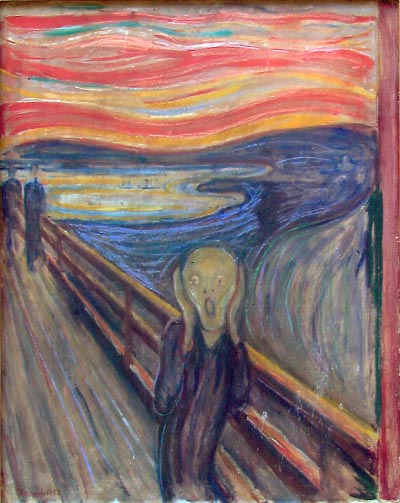
E. Munch, The Scream, 1893
That is my understanding of sovereignty. (For very different interpretations of of Munch's painting see Bonyton)
It is not just the intensity of anxiety or dread. It can also be the intensity of religious ecstasy.
Or the intensity of sexual orgasm. Or the intensity of being raped.
So my understanding of sovereignty is quite different the passive conception of from the dairy cow chewing cud in the field. It is the emotional intensity that obliterates the boundaries of the self that make us self-contained individuals.
[previous]
December 11, 2003
Bataille: On Nietzsche#3: its like a weblog
Trevor,
I've also been struggling with Bataille's On Nietzsche. I too have been wondering what is going on in this text. My solution is to read it as a proto-weblog.
It is not a weblog as a personal diary in the sense of the content of many of the Adelaide weblogs. Most of these are concerned with, 'I did this, I've got problems with the boss at work, I went to this see this film at a cinema in Rundle Street, I'm having problems with my hair dresser, I'm having a bad day, I passed my exams at uni. with these grades etc.'
Many of these dairy weblogs are very good at this, even if they are very reticent about their sexual experiences.
Bataille's "weblog" is more a poetic/philosophical journal that articulates or rather explores his concerns with his inner experience in a conversation with Nietzsche's texts on a regular basis.
In Chapter 2 of On Nietzsche we find Bataille exploring morality in terms of breaking the moral law of the old codes and beginning a difficult journey of exploring other possibilites beyond the good. Bataille puts down few ideas down, then links to passages in Nietzsche's The Will to Power. ( I can never find the dam quotes).
These links are about turning away from the past, creating the future, increasing our freedom, celebrating our liveliness, living in hopefulness. The future is sketched as seen as surpassing limits.
Just as an aside. You can see Foucault in a lot of this in freedom as living through surpassing the limits. These are the limits of moral codes not the surpassing of biological limits through the genetic engineering of our offspring.
December 10, 2003
Sovereignty et cetera
Gary, One of the honours students called up the other day on a social visit. I described to him your recent discussion of sovereignty and he raised what I thought was a very good point. Are you not experiencing sovereignty when asleep? he asked. I thought about it and it seemed to me that sovereignty might be described as like the condition of sleep, except that you are awake.
I struggled through On Nietzsche a year or so ago, and I mean I struggled. One of the problems, I think, was that I didn't really know what was going on or what I was supposed to get from the book. Inner Experience and Guilty offer rather similar experiences. What do they have in common with Nietzsche’s writings? Well, one thing is their literary form. They are not intended to be philosophical treatises, even if there are occasional sections and passages that have philosophical qualities. As you say, in the beginning of On Nietzsche he seems to be living alone, in the countryside possibly – I’m just going on memory here. He’s reading The Will To Power. From what I remember of this book, it’s posthumous and consists of an arrangement of notes. Perhaps I should call them aphorisms. Bataille’s three books are a similar form to The Will To Power.
Answer me this: what is it that we should get from Nietzsche’s book and is this the same thing we should expect from Bataille?
In the spirit of sticking pieces in by Bukowski that are kicking around the Web, here is a short prose piece, which I will call Prose One:
A MAN
Charles Bukowski
George was lying in his trailer, flat on his back, watching a small portable T.V. His dinner dishes were undone, his breakfast dishes were undone, he needed a shave, and ash from his rolled cigarettes dropped onto his undershirt. Some of the ash was still burning. Sometimes the burning ash missed the undershirt and hit his skin, then he cursed, brushing it away. There was a knock on the trailer door. He got slowly to his feet and answered the door. It was Constance. She had a fifth of unopened whiskey in a bag.
"George, I left that son of a bitch, I couldn't stand that son of a bitch anymore."
"Sit down."
George opened the fifth, got two glasses, filled each a third with whiskey, two thirds with water. He sat down on the bed with Constance. She took a cigarette out of her purse and lit it. She was drunk and her hands trembled.
"I took his damn money too. I took his damn money and split while he was at work. You don't know how I've suffered with that son of a bitch."
“Lemme have a smoke," said George. She handed it to him and as she leaned near, George put his arm around her, pulled her over and kissed her.
"You son of a bitch," she said, "I missed you."
"I miss those good legs of yours , Connie. I've really missed those good legs."
"You still like 'em?"
"I get hot just looking."
"I could never make it with a college guy," said Connie. "They're too soft, they're milktoast. And he kept his house clean. George, it was like having a maid. He did it all. The place was spotless. You could eat beef stew right off the crapper. He was antisceptic, that's what he was."
"Drink up, you'll feel better."
"And he couldn't make love."
"You mean he couldn't get it up?"
"Oh he got it up, he got it up all the time. But he didn't know how to make a woman happy, you know. He didn't know what to do. All that money, all that education, he was useless."
"I wish I had a college education."
"You don’t need one. You have everything you need, George."
"I’m just a flunkey. All the shit jobs."
"I said you have everything you need, George. You know how to make a woman happy."
"Yeh?"
"Yes. And you know what else? His mother came around! His mother! Two or three times a week. And she'd sit there looking at me, pretending to like me but all the time she was treating me like I was a whore. Like I was a big bad whore stealing her son away from her! Her precious Wallace! Christ! What a mess! He claimed he loved me. And I'd say, 'Look at my pussy, Walter!' And he wouldn't look at my pussy. He said, 'I don't want to look at that thing.' That thing! That's what he called it! You're not afraid of my pussy, are you, George?"
"It's never bit me yet."
"But you've bit it, you've nibbled it, haven't you George?"
"I suppose I have."
"And you've licked it, sucked it?"
"I suppose so."
"You know damn well, George, what you've done."
"How much money did you get?"
"Six hundred dollars."
"I don’t like people who rob other people, Connie."
"That's why you're a fucking dishwasher. You're honest. But he's such an ass, George. And he can afford the money, and I've earned it... him and his mother and his love, his mother-love, his clean little wash bowls and toilets and disposal bags and breath chasers and after shave lotions and his little hard-ons and his precious love-making. All for himself, you understand, all for himself! You know what a woman wants, George."
"Thanks for the whiskey, Connie. Lemme have another cigarette."
George filled them up again. "I missed your legs, Connie. I've really missed those legs. I like the way you wear those high heels. They drive me crazy. These modern women don't know what they're missing. The high heel shapes the calf, the thigh, the ass; it puts rhythm into the walk. It really turns me on!"
"You talk like a poet, George. Sometimes you talk like that. You are one hell of a dishwasher."
"You know what I'd really like to do?"
"What?"
"I'd like to whip you with my belt on the legs, the ass, the thighs. I'd like to make you quiver and cry and then when you're quivering and crying I'd slam it into you pure love."
"I don't want that, George. You've never talked like that to me before. You've always done right with me."
"Pull your dress up higher."
"What?"
"Pull your dress up higher, I want to see more of your legs."
"You like my legs, don't you, George?"
"Let the light shine on them!"
Constance hiked her dress.
"God christ shit," said George.
"You like my legs?"
"I love your legs!" Then George reached across the bed and slapped Constance hard across the face. Her cigarette flipped out of her mouth.
"What’d you do that for?"
"You fucked Walter! You fucked Walter!"
"So what the hell?"
"So pull your dress up higher!"
"No!"
"Do what I say!" George slapped again, harder. Constance hiked her skirt.
"Just up to the panties!" shouted George. "I don’t quite want to see the panties!"
"Christ, George, what's gone wrong with you?"
"You fucked Walter!"
"George, I swear, you've gone crazy. I want to leave. Let me out of here, George!"
"Don’t move or I'll kill you!"
"You’d kill me?"
"I swear it!" George got up and poured himself a shot of straight whiskey, drank it, and sat down next to Constance. He took the cigarette and held it against her wrist. She screamed. HE held it there, firmly, then pulled it away.
"I'm a man, baby, understand that?"
"I know you're a man , George."
"Here, look at my muscles!" George sat up and flexed both of his arms.
"Beautiful, eh ,baby? Look at that muscle! Feel it! Feel it!"
Constance felt one of the arms, then the other.
"Yes, you have a beautiful body, George."
"I'm a man. I'm a dishwasher but I'm a man, a real man."
"I know it, George."
"I'm not the milkshit you left."
"I know it."
"And I can sing, too. You ought to hear my voice."
Constance sat there. George began to sing. He sang "Old man River." Then he sang "Nobody knows the trouble I've seen." He sang "The St. Louis Blues." He sang "God Bless America," stopping several times and laughing. Then he sat down next to Constance. He said, "Connie, you have beautiful legs." He asked for another cigarette. He smoked it, drank two more drinks, then put his head down on Connie's legs, against the stockings, in her lap, and he said, "Connie, I guess I'm no good, I guess I'm crazy, I'm sorry I hit you, I'm sorry I burned you with that cigarette."
Constance sat there. She ran her fingers through George's hair, stroking him, soothing him. Soon he was asleep. She waited a while longer. Then she lifted his head and placed it on the pillow, lifted his legs and straightened them out on the bed. She stood up, walked to the fifth, poured a jolt of good whiskey in to her glass, added a touch of water and drank it sown. She walked to the trailer door, pulled it open, stepped out, closed it. She walked through the backyard, opened the fence gate, walked up the alley under the one o'clock moon. The sky was clear of clouds. The same skyful of clouds was up there. She got out on the boulevard and walked east and reached the entrance of The Blue Mirror. She walked in, and there was Walter sitting alone and drunk at the end of the bar. She walked up and sat down next to him. "Missed me, baby?" she asked. Walter looked up. He recognized her. He didn't answer. He looked at the bartender and the bartender walked toward them They all knew each other.
Bataille: Intensity
This painting by Gerhard Richter strikes me as controlled emotional frenzy.

Gerhard Richter, Station, 1985, Oil on canvas.
Is this a representation of what Bataille means by intensity?
I reckon I stood on the threshold of that experiental state today, when I was walking though the city in the full sun. The temperature would have been around 40 degrees and a hot north wind was blowing hard from the desert. The buildings and pavement radiated heat. The sweat just dried instantly. I sort of stumbled through the city barely conscious of my individuality. My whole body was screaming. I moved very slowly saving as much energy as I could. My one thought. Survival.
Yet all the time I was raging inside. Screaming with hatred at the inhuman weather and at having to live and work in such conditions. I sensed something bad was happening. The summer seems to get worse each year. Things are changing. I had fear in my guts. I looked at all the cars and cursed. I felt like screaming at the excretions of the economy that now influences our weather.
We call it global warming. It means summer will be hotter and drier in Adelaide as the level of carbon dioxide in the atmosphere increases. We will be talking 45 degrees in Adelaide not 40 degrees. And the winds will be stronger.
By then the perma frost near the Arctic will have melted, as will the glaciers in New Zealand. Will we still be building more motorways and ever more coal-fired power-stations to run the air conditioners?
As I said I stood on the threshold of intensity and got a glimmer of what Bataille was talking about.
And I didn't really care that robots would be the new life form that replaces humans. I was just raging incoherently at the weather.
December 09, 2003
quote
"I believe that truth has only one face: that of violent contradiction."
-George Bataille
Sounds like old Hegel to me Trevor.
connections
Trevor, you may find this part of an interview with Stephen David Ross over at Artrift of interest. Ross says the following:
"....but the experience I described as shared by philosophy and by art seemed to be divided in two, one the sense of a deep, intense, and transfigurative experience that touched the full range of human possibilities and put them into question, filled with feeling, intensity, reflection, depth; the other, the sense of new, unfamiliar, strange, remarkable, unexpected encounters. Clearly these are in some way the same, yet one is more a consummatory, fulfilling experience, grand, powerful, and deep. Here, a great work of art--and for me of philosophy as well---is an achievement, accomplishes and builds something magnificent and unprecedented. The other is much more disturbing, unsettling, displacing, transforming. I would now wish to assimilate the first to the second, so that the sense of consummation and fulfillment is not so much to be held onto but to be recognized for its unsettlements and transformations. Much of this displacement is the result of the last century in Western art and aesthetics and in new understandings of the role of art in cultural practices around the world."
Though Bataille and Klossowski are not mentioned in the interview, the 'transfigurative' experience is very similar ideas to those being discussed in this weblog, don't you think?
Ross says that art and philosophy have been, and should be, associated with calling authority into question; being rebellious, disruptive, unorthodox, nurturing unexpected transfigurations, and playing the role of rebel. This is what I see as the 'philosophical moment' in Nietzsche and Bataille: it opens up to a philosophy that is disruptive, transformative, disturbing and always seeking new questions and alternatives. This is a long way from philosophy in the academy. which has sides with the forces of authority. You can only discern fragments of a philosophy that expresses what is unfamiliar, strange, and disruptive.
Have a look when you have a mo.
December 07, 2003
Bataille: On Nietzsche#2: alone in the cosmos
I'm continuing to read Bataille's On Nietzsche. I've just started Chapter 1.
Bataille appears to be living alone in isolation with Nietzsche's text, The Will To Power. In the opening chapter Bataille says that this text is his company on earth.
Bataille quotes a paragraph in The Will to Power where Nietzsche says:
"If from the death of God, we don't fashion a major renunciation and perpetual victory over ourselves, we'll have to pay for that loss."
I cannot find the quote in Nietzsche's text. No matter. It is just pulled out and used as a part of Bataille's narrative.
Bataille interprets this sentence to mean that we cannot rely on anything but ourselves. He finds that responsibility overwhelming. He understands that he stands in a new era. Previously people always relied on each other, or God. No longer.
Now we stand alone in the chaos, nothingness and nihilism. Stripped of the old moral clothing that once protected us. We are homeless.
By 'the death of God' Nietzsche means that Europeans are losing the centre of moral gravity by virtue of which we have lived for 2 thousand years. The old Christian moral antidote against nihilism no longer works for us. We are lost---the universe seems to have lost value and has become meaningless---and we plunge into opposite valuations.
We stand alone. Stripped. Confronting the chaos and wildness of nature and sensing the blood rage surging within us. Bataille says:
"And don't I too carry within me a blood rage, a blindness satisfied by the hunger to met out blows? How would I enjoy being a pure snarl of hatred, demanding death: the upshot being no prettier than two dogs going at it tooth and nail!"
This passage illustrates Bataille's idea of the intensity of experience that you mentioned in this earlier post.Intensity is a redescription of Nietzsche's Dionysian impulse or mode of existence in The Birth of the Tragedy, which he identified suffering as the emotional basis for community and tragedy.
Bataille then quotes Nietzsche to the effect of everyone walking naked, the good and the bad, side by side. For those who live knowledge this is a celebration. These thinkers look inside themselves, as this leads directly to chaos and a labyrinth existence.
So Bataille's pathway from nihilism makes a turn inward to inner experience. It is what we would call the "psychoanalytic" pathway.
December 06, 2003
strange world
Trevor,
This case reminds me of one you mentioned to me recently. In the former case a professor, who is also a director of the National Central University's Center for the Study of Sexuality, was accused of offenses against morality for creating a link from her university department's Web site to a site promoting bestiality.
The case you mentioned involved a casual tutor/lecturer being fired on the spot by the University of South Australia for introducing Catherine Breillat's recent Romance into an undergraduate course on rhetoric and communication. From memory he was dismissed for introducing "pornography" (was the charge corrupting the young?) after a complaint by a student.
In these two cases moral codes were transgressed. These Bataillean moments of transgressive sexuality were quickly repudiated as beyond the pale and unacceptable conduct.
How ironic, given that we are surrounded by images of female bodies that are offered as an exhibit for our (masculine) enjoyment. These are images in which the camera displays, and lingers over the female body as an object. This culture industry image making, which offers visual pleasure, is deemed perfectly acceptable. It is seen to be erotic and beautiful. It is morally okay in the administered world of a universal instrumental reason. These (often daring) images promise sexual freedom in opposition to the traditional puritanical (wowser) culture.
In this world the particular (or the individual and subjectivity) represents the theoretically boundless world of human possibility and play. When we introduce female sexuality, in terms of the intensity of female experience. into the eroticism of the cultural industry it is deemed to be pornographic.
An example:
 This is the French poster for the film Romance, and it features a naked woman with her hand between her legs.
This is the French poster for the film Romance, and it features a naked woman with her hand between her legs.
A large red X is printed across the image, thus revealing the source of the trouble: a woman in touch with her own sense of sexual pleasure. It is an image suggesting a women gaining pleasure from masturbating.
In Australia Breillat is still seen, and is dismissed, as the author of porn (in the tradition of de Sade), rather than seen as a European film maker working in the cinematic tradition.
After yesterday we have higher education legislation passed by the Australian Senate that allows the federal Minister of Education to disallow courses that he deems to be inappropriate.
December 04, 2003
Bukowski Poem#6
CONFESSION
waiting for death
like a cat
that will jump on the
bed
I am so very sorry for
my wife
she will see this
stiff
white
body
shake it once, then
maybe
again
"Hank!"
Hank won't
answer.
it's not my death that
worries me, it's my wife
left with this
pile of
nothing.
I want to
let her know
though
that all the nights
sleeping
beside her
even the useless
arguments
were things
ever splendid
and the hard
words
I ever feared to
say
can now be
said:
I love
you.
Charles Bukowski
December 03, 2003
The Story So Far
Gary, I think your discussion of sovereignty has become quite excellent. Let me try to summarise it as a coda.
There is a problem in understanding sovereignty from standard Hegelian and Nietzschean perspectives. One needs to shift from philosophy to surrealism, from a concern with reason to a concern with the irrational. This surrealism is not about the fantastic or the immediate world of dreams and nor is it obscure, but it seeks through surprise and shock therapy to liberate vision from its constraints. Less an expression of personal fantasy or neurosis, this surrealism aims at expressing the darker side of subjectivity.
You introduced two images: Masson's image of a headless male, emphasising the body and bodily desire, and Magritte's 'Lovers' paintings, in which hooded bodies represent unconscious amoral sexual desire, physical intensity and bodily pleasure. There are no faces here, no subjects, no subjectivity. Bataille's novella 'My Mother' concludes with an image of two women who are naked but masked. Leiris has remarked on Bataille's fascination with such images.
It is interesting to note that Magritte spoke of his work as trying to paint the impossible. Ivan and I have come to regard Magritte's painting 'Rape'
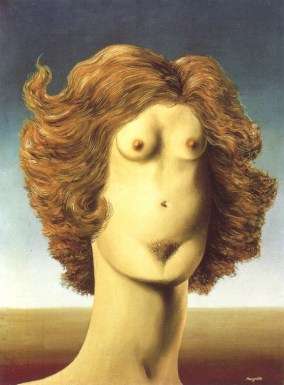
as one of his greatest achievements in this regard.
See our discussion in the 'A ma soeur' article which has been placed in the Library.
As you say, sexual union causes a momentary indistinguishability between otherwise distinct objects, or better, an indistinguishability of subjects.
This loss of self is freedom, sovereignty. Sexual activity may lead to a momentary loss of self, which you equate with religious ecstasy. This is different from Hegelian and Nietzschean ideas of sovereignty as the right or force of command oneself and one's dominions. In contrast, for Bataille sovereignty is the property of an inner relation of the human animal to the objects of desire. As you say, 'sovereignty is the collapse of the dualism that grounds Western thought -- subject/object, good/evil, body/spirit.' Political sovereignty is the opposite of inner sovereignty. As 'soon as I say "I am sovereign" I am not. As soon as I realize that my self has fallen away, it has returned.' I may experience sovereignty but I can never possess it.
You want to take these ideas, which are derived from a break with reason, and bring them into a moral calculation, which you do by conceiving of what you call 'Bataille's philosophy' through Nietzschean glasses as a transvaluation of all values. Thus, access to the sacred is not available to those who behave themselves, observing prohibitions and taboos, but rather is available only to those who, while acknowledging the force of the moral taboos in everyday life, wilfully transgress them. The values transvalued are those embodied in what is tabooed.
You relate Bataille ideas to Nietzsche's Genealogy of Morals, an account of the origin of moral ideas in European civilization. Bataille shows that the opposition between good and evil is related to the formation of subjectivity, a
'breeding ground for that terrible sickness, bad conscience'. Gombrowicz is making a similar point when he remarks:
'Man, tortured by his mask, fabricates secretly, for his own usage, a sort of "subculture": a world made out of the refuse of a higher culture, a domain of trash, immature myths, inadmissible passions....a secondary domain of compensation. That is where a certain shameful poetry is born, a certain compromising beauty....Are we not close to Pornografia?' (Pornografia, p. 8)
The big danger for those tortured by a desire for sovereignty is that this desire can be manipulated for utilitarian motives. In fact, the wanting is what is manipulated. Wanting is stimulated. I might do a painting, say of some woman, naked, legs apart, in which I can lose myself. Yes, it's shameful, it's compromising, yet it is different from the otherwise identical image created to make a dollar. In the end, that is what it is all about; that is why we don't experience sovereignty. I do not want dominion of you in order to live exactly as you live. If I seek it, it is because I want to live better than you, because I want to live at your expense.
The question is--and it's the big question, the biggest even--does all utilitarian calculation have this consequence? That is, does all utilitarian thinking inevitably lead to exploitation, or is its use in exploitation something additional? On this question depends the fate of philosophy. The conservative forces--the analysts, the rationalists, the enlightenment types--see philosophy as somehow timeless, utilitarian reason no doubt but of the most abstract and universal kind, the very antithesis of exploitation. We can slip back into Hegel easily at this point. Rousseau thought it all went wrong when someone said, 'This is mine', but perhaps it was when someone said, 'I can do this!'
December 02, 2003
Bataille & eroticism: a quote
"For the man who cannot escape his own nature, the man whose life is open to exuberance, eroticism is the greatest personal problem of all. At the same time it is a universal problem in a way that no other problem is."Georges Bataille, Eroticism: Death And Sensuality
For both Nietzsche and Bataille we humans are passionate beings. What Bataille makes explicit is that we are also erotic beings. He writes that:
"The whole business of eroticism is to strike to the inmost core of the living being so that the heart stands still....The whole business of eroticism is to destroy the self-contained character of the participators as they are in their normal lives."
Philosophy must come to terms with the passionate and erotic basis of human life. To exclude eroticism from philosophy is to exclude the well-spring of life. Most philosophy is divorced from life.
December 01, 2003
Bataille & Nietzsche
My interpretation of Bataille's texts is that he works in the tradition of Nietzsche's Genealogy of Morals. That text of Nietzsche's probed the origin of moral ideas by telling a story of masters and slaves; questioned the value of the notions of good and evil in European civilization; and showed the ways in which our orientations have been poisoned by the world view of the Christian tradition. His central problem is stated early in the Preface (para 3):
"....under what conditions did man devise these value judgments good and evil? and what value do they themselves possess? Have they hitherto hindered or furthered human prosperity? Are they a sign of distress, of impoverishment, of the degeneration of life? Or is there revealed in them, on the contrary, the plenitude, force, and will of life, its courage, certainty, future?"
Nietzsche argued that we have become habituated to the old patterns of thought and conduct of the ascetic ideal that are increasingly poisonous. We are wounded from the effects of the slow-working poisons.
Nietzsche recognized, as Bataille did after him, that in terms of the lived human experience human beings live within a metaphysics that supports a positive definition of value about life. There is a direct connection between a negative metaphysics of value that stunts our lives and the ability or capacity of human beings to relate 'positively' to the world, to the body and to each other. Thus the idea of poisons.
Nietzsche's attack on traditional Western philosophy (and Christianity) and its value of "life-negation" is all centered around this issue. To say "Yes to Yes", to say "Yes to Life", is to say "Yes" to metaphysics of life enhancement, of intensity, of becoming.
Bataille reworks this tradition of geneology. He does so by showing the opposition between good and evil under the light of morality as an intimate problem of subjectivity. Nietzsche never treated morality as an "intimate" problem. In contrast, Bataille explores our interior world of subjectivity the breeding ground for that terrible sickness, bad conscience. He thus reworks the opposition between good and evil in the light of inner experience.
In this reworking of Nietzsche's Genealogy of Morals intensity of experience is everything. The argument is that the distinction between good and evil, operative in the context of vulgar morality, is inadequate to express the intense experiences that rip beings apart. Bataille is more shocking than Nietzsche because he allows us to see his terror and torment in a gesture of free play.
Could not the intensity of inner experience Could not intensity be value for Bataille? Affirmation, the affirmation of becoming, is a positive intensity. the erotic impulses (p. 7). What is most intense is our Christian religious experience and our erotic passions. They blend into one another for Bataille and become one and the same movement of assenting to, or affirming, life.
It is the inner experience of sexuality that distinquishes the erotic from sex as copulation. A lot of contemporary online porn is about copulation and not the inner experience of sexuality.
Sylvere Lotringer says that:
"All societies are founded on collective crimes which are subsequently denied by their many beneficiaries. Complicity and denial are constitutive of morality: concern for utility is merely there to suture the wound."
Fear and anxiety are our wounds in liberal civilization. The moral way our civilization understands these wounds are the symptoms of a crisis that we've never recovered from, just bypassed, forgotten and decodified into the ahistoricity and hyper reality of late capitalist societies.
